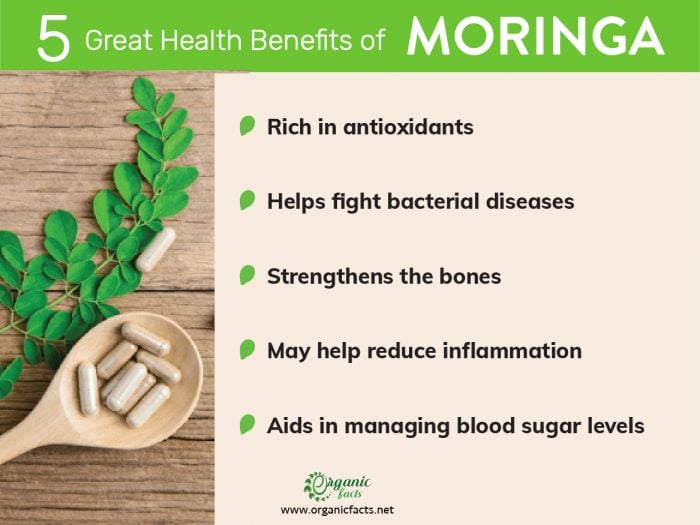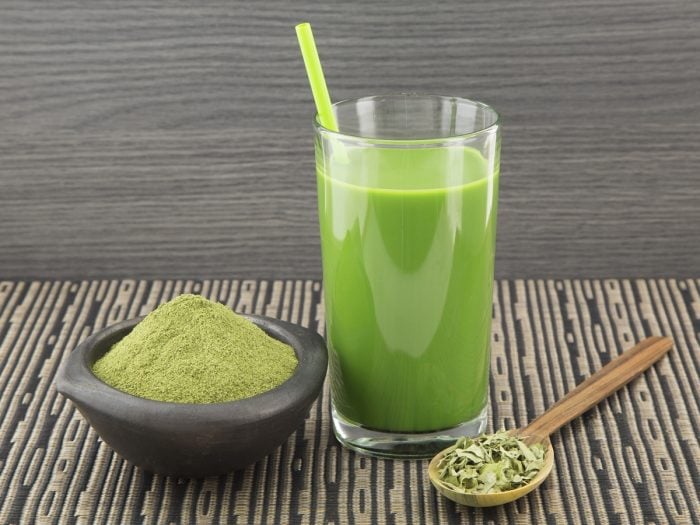Moringa, often called the ‘miracle tree’, is rich in antioxidants and essential nutrients. It supports heart health, protects the liver, reduces inflammation, and lowers cholesterol. In Ayurvedic therapy, moringa is valued for its ability to treat a wide range of health issues such as digestive disorders, allergies, and edema. Its antifungal, antiviral, and anti-inflammatory properties make it a versatile remedy in both traditional and modern medicine.
What is Moringa?
Moringa oleifera, also known as drumstick tree or the “miracle tree”, is a highly valued and versatile plant belonging to the Moringaceae family. It is a fast-growing, deciduous tree that is native to India and is widely cultivated in tropical and subtropical areas all over Asia, Africa, and South America. It is widely known by many other names, including the Horseradish tree and Ben oil tree. Its tree has a thick, whitish bark with droopy, fragile branches and long, green, oval-shaped leaflets. Due to its numerous health benefits, it is also found in the form of capsules, supplements, and powder.
Moringa has been imparting a multitude of benefits across various cultures since ancient times. It was valued by the Romans, Egyptians, and Greeks for its medicinal impact on a range of ailments. Today, its usage has been encouraged by various humanitarian organizations. The purpose is to combat malnutrition and its effects in poverty-stricken regions, mainly due to its economic viability and rapid growth. Moreover, due to its extraordinary and unmatched range of medicinal benefits, it was named the “miracle tree” during the food crisis in Africa. [1] [2]
Nutrition Facts
| Serving Size : | |
|---|---|
| Nutrient | Value |
| Water [g] | 78.66 |
| Energy | 64 |
| Energy [kJ] | 268 |
| Protein [g] | 9.4 |
| Total lipid (fat) [g] | 1.4 |
| Ash [g] | 2.26 |
| Carbohydrate, by difference [g] | 8.28 |
| Fiber, total dietary [g] | 2 |
| Calcium, Ca [mg] | 185 |
| Iron, Fe [mg] | 4 |
| Magnesium, Mg [mg] | 42 |
| Phosphorus, P [mg] | 112 |
| Potassium, K [mg] | 337 |
| Sodium, Na [mg] | 9 |
| Zinc, Zn [mg] | 0.6 |
| Copper, Cu [mg] | 0.11 |
| Manganese, Mn [mg] | 1.06 |
| Selenium, Se [µg] | 0.9 |
| Vitamin C, total ascorbic acid [mg] | 51.7 |
| Thiamin [mg] | 0.26 |
| Riboflavin [mg] | 0.66 |
| Niacin [mg] | 2.22 |
| Pantothenic acid [mg] | 0.13 |
| Vitamin B-6 [mg] | 1.2 |
| Folate, total [µg] | 40 |
| Folate, food [µg] | 40 |
| Folate, DFE [µg] | 40 |
| Vitamin A, RAE [µg] | 378 |
| Vitamin A, IU [IU] | 7564 |
| Tryptophan [g] | 0.14 |
| Threonine [g] | 0.41 |
| Isoleucine [g] | 0.45 |
| Leucine [g] | 0.79 |
| Lysine [g] | 0.54 |
| Methionine [g] | 0.12 |
| Cystine [g] | 0.14 |
| Phenylalanine [g] | 0.49 |
| Tyrosine [g] | 0.35 |
| Valine [g] | 0.61 |
| Arginine [g] | 0.53 |
| Histidine [g] | 0.2 |
| Alanine [g] | 0.71 |
| Aspartic acid [g] | 0.92 |
| Glutamic acid [g] | 1.04 |
| Glycine [g] | 0.52 |
| Proline [g] | 0.45 |
| Serine [g] | 0.41 |
| Sources include : USDA [3] | |
According to the USDA, moringa pods also contain a significant amount of vitamins such as vitamin A, vitamin B1 (thiamine), B2 (riboflavin), B3 (niacin), B6, folate, and ascorbic acid (vitamin C). Its mineral wealth includes calcium, potassium, iron, magnesium, phosphorus, and zinc. It contains a very low amount of fats and offers no harmful cholesterol.
The overall nutritive value of moringa is truly beneficial to combat undernutrition, according to a study by Dr. Jed W. Fahey, Johns Hopkins Bloomberg School of Public Health, US.
Health Benefits of Moringa
Here are the health benefits of Moringa backed with scientific evidence.
Powerful Antioxidants
The moringa plant offers a rich blend of powerful antioxidants such as kaempferol, caffeoylquinic acid, zeatin, quercetin, rutin, chlorogenic acid, and beta-sitosterol. Cooking moringa leaves enhance some of this antioxidant activity and increase iron. These powerful antioxidants found in moringa possess free radical scavenging capacity and have shown its therapeutic value in curing the damage caused by oxidative stress.
Lower Blood Sugar Levels
Research studies demonstrate that administering moringa helps in managing blood glucose levels, urine sugar, and urine proteins in test subjects with diabetes. Intake of its extract has shown a remarkable improvement in the hemoglobin levels and total protein content of the subjects. A review published in the Frontiers in Pharmacology journal supports that its leaves may be useful in treating chronic hyperglycemia and dyslipidemia (high blood lipid levels).

Moringa is often called the drumstick tree or the miracle tree. Photo Credit: Shutterstock
Reduces Cholesterol
Moringa is effective in maintaining optimal levels of blood pressure and cholesterol levels in the body. Bioactive components such as isothiocyanate and niaziminin present in it prevent the thickening of arteries and reduce the development of pulmonary hypertension by dilating the blood vessels. Studies using animal models have confirmed its hypocholesterolemic effects help in reducing a high-fat rise in the liver, kidney, and serum cholesterol levels.
Helps with Edema
Moringa extracts are beneficial in the treatment of edema. Multiple research studies have confirmed that treatment with drumstick root extract, which possesses anti-inflammatory qualities, has been significantly effective in inhibiting the development of edema. Moreover, these studies suggest that the efficacy of this herb stands equal with the potent anti-inflammatory medicine indomethacin in the treatment of such painful conditions.
Protects Liver
Moringa extracts exert a hepatoprotective effect on the liver. According to a study published in the Journal of Medicinal Food, moringa leaves are effective against liver damage and speed up the recovery process. It also helps to restore the balance in the immune system and prevents radiation-induced effects tested on animal subjects. This protective effect is attributed to the presence of phytochemicals such as catechin, epicatechin, ferulic acid, and vitamin C found in the drumstick.
Relieves Stomach Disorders
The isothiocyanates present in moringa are effective in the treatment of abdominal disorders such as constipation, gastritis, and ulcerative colitis. Research showed that its extracts can be considered as an effective herbal alternative to a range of commercially available antacids and antihistamines.
According to a study published in the Phytomedicine journal, treatment with moringa extract leads to reduced ulceration. Its efficacy in curing ulcerative colitis is comparable with the commercially available drug prednisolone. It contains antibiotic and antibacterial properties and exerts inhibitory effects on the growth of various pathogens. This includes helicobacter pylori bacteria and coliform bacteria (associated with stomach ulcers), which can trigger diarrhea. It also helps in combating obesity thanks to its high nutritional and low-calorie properties. The vitamin B content in its leaves aids in digestion and converts the food into energy rather than storing it as fat.
Skin Care & Hair Care
Moringa seed oil is beneficial for the skin and hair and is effective against the infection caused by the herpes simplex virus. The healing effects of this herb prevent the development of skin lesions and inhibit the formation of plaque caused by the infecting virus. The hydrating and antioxidant effects of moringa extracts help in neutralizing the effects of harmful pollutants, prevent wrinkles, and slowdowns aging. For the same reason, it is used in the production of cosmetics and skincare products as well.
The favorable effects of moringa seed oil for hair care have been appreciated since ancient times. It is highly beneficial in protecting the hair from environmental damage, including ultraviolet radiation. It serves as a valuable conditioner for the scalp, strengthens the roots, and stimulates hair growth too.
Antibacterial Agent
It possesses antibacterial, antifungal, and antimicrobial properties, and is effective against the growth of disease-causing microbes. Scientific research has proven that moringa extracts exert a wide spectrum of protective activity against food-borne microorganisms such as Salmonella, Rhizopus species, E. Coli, Enterobacter aerogenes, Pseudomonas aeruginosa, and Staphylococcus aureus. This defensive activity makes its extracts perfect for sanitation and preservation purposes. Leaves of this plant possess antifungal qualities. The inhibitory effects of moringa help in preventing the growth of diseases causing contaminant fungi such as Aspergillus spp. and Penicillium spp.
Neurodegenerative Diseases
The effectiveness of moringa has been very valuable in the management and reduction in the risk of neurodegenerative diseases. Research studies have shown the potential to alter brain electrical activity and monoamines like norepinephrine, serotonin, and dopamine, and may extend protection against Alzheimer’s disease.
Improves Bone Health
Moringa extracts are beneficial for maintaining healthy bones, which is attributed to the presence of essential minerals like calcium and phosphorus. Moringa has even been shown to enhance the efficiency and bioavailability of these minerals vital to bone health. The extracts possess anti-inflammatory properties and are effective in relieving inflammatory conditions such as arthritis. Further, the extracts help to heal various bone ailments such as mandibular or jaw bone fracture.
Boosts Immunity
The ethanolic extracts of moringa leaf helps in stimulating the immune system of the body. It also helps in enhancing the cellular immune response and exerts positive effects on various other immune system values such as total leucocyte count, antibodies, and hypersensitivity reaction.
Immunosuppressive Properties
Ethanolic extract from moringa seeds possesses immunosuppressive properties. Deliberate immunosuppression is required to inhibit the activation of the body’s immune system to prevent rejection of treatments such as organ transplants and autoimmune diseases like rheumatoid arthritis as well as some allergic reactions. Research published in the Journal of Ethnopharmacology demonstrated that the immunosuppressive action of drumstick seeds helps in improving the production of antibodies to allow new organs and transplanted material to settle safely in the body.
Protects the Cardiovascular System
Moringa extracts are helpful in the prevention of myocardial or cardiac damage, due to the presence of powerful antioxidants and also exert antidiabetic effects. Research studies conducted on this subject have provided supporting evidence that proves the antiperoxidative and cardioprotective effects of moringa therapy. Moringa helps in inhibiting the increase in lipid peroxidation in the myocardial tissue and aids in maintaining a healthy heart.
Relieves Asthma
The benefits of moringa plant extracts include relief from bronchial asthma and inflammation caused in the airways. The extracts of moringa seeds possess anti-allergenic qualities. Scientific research has validated the inhibitory action of moringa on the hypersensitive reactions involved in various allergic diseases, including allergic rhinitis and anaphylaxis. According to research, treatment with the vegetable helps reduce the severity of asthmatic attacks and various symptoms such as wheezing, cough, dyspnea, and contraction of the chest be reducing the histamine release response from mast cells in the immune system. It extends its protective effects against bronchial constrictions and encourages better lung function and respiration.

Moringa was valued by the Romans, Egyptians, and Greeks for its medicinal impact on a range of ailments.
Blocks Stone Formation
Moringa extracts are effective against the formation of stones in the kidney, bladder, and uterus. According to a study in the Journal of Ethnopharmacology, the administration of Moringa root exerted anti-urolithic activity and resulted in a significant reduction in the urinary oxalate levels. The curative effect of moringa has also shown a reduction in the formation of stone deposits and aids in regulating endogenous oxalate synthesis.
Protects against Kidney Problems
Moringa extracts exert a protective effect against nephrotoxicity, which refers to the kidney problems caused as a consequence of exposure to certain drugs or toxins. Studies have revealed that the nephroprotective effect of moringa helps in attenuating renal injuries due to its high antioxidant content. The kidneys of test subjects treated with moringa showed improvement and signs of repair, likely due to its ability to inhibit lipid peroxidation. It serves as an effective bio-absorbent and helps in the removal of heavy metals and harmful toxins.
Has Anti-fertility Effects
Moringa possesses anti-fertility qualities as well. Aqueous extracts of moringa exert estrogenic activity and are beneficial in the prevention of sexual implantation in the body.
Heals Wounds
The aqueous extract of moringa possesses vital wound healing properties due to its ability to increase collagen deposition. Research studies have provided evidence supporting the healing effects of moringa in the treatment of wounds concerning skin-breaking strength, wound closure rate, and reduction in the scar area.

Fresh moringa juice Photo Credit: Shutterstock
Improves Eye Health
Antioxidant-rich moringa is beneficial for protecting against retinal damage. Scientific studies on animal models have provided backing evidence regarding the retinal-protective effects of moringa. Moringa has shown suppression of retinal inflammation in diabetic test subjects. Treatment with it helps in preventing the dilatation of retinal vessels and keeps the retinal vasculature intact. It also inhibits the thickening of capillary membranes and prevents retinal dysfunction. These results suggest that moringa “may be useful in preventing diabetes-induced retinal dysfunction.”
Relief from Anemia & Sickle Cell Disease
Moringa extracts are beneficial in the treatment of anemia and sickle cell diseases. Studies show that treatment with moringa aids in facilitating the absorption of iron, increasing the red blood cell count, and helping to maintain normal blood parameters. Recent studies also validate the anti-sickling potential of moringa plant extracts, attributed to the presence of zinc and flavonols such as kaempferol, quercetin, and acacetin, as well as phenolic acids such as melilotic acid and vanillic acid.
Other Benefits
Moringa helps in improving memory. It possesses anti-epileptic properties and helps in combating depression, anxiety, and fatigue. The anti-inflammatory properties and high vitamin content of moringa are valuable for treating scurvy and catarrhal conditions. It is useful for the regulation of thyroid hormones and is effective in curing skin infections and sores. In the Philippines, it is referred to as a mother’s best friend because of its galactagogue properties.
Where to Buy Moringa?
- Moringa powder, its extract, and moringa capsules are available in online stores, pharmacy outlets, as well as in the health section of supermarkets.
- Drumstick, the fruit of the tree, and its leaves can be obtained from Asian stores, local Indian markets, or sometimes, if you are really lucky, you may have a tree growing in your backyard!
The powder can be used to make a light, refreshing moringa tea. It is always advisable to check with your doctor before adding herbal supplements to your diet.
Uses of Moringa
- Moringa is a “miracle tree” and most of its parts, including the leaves, bark, fruits, and roots are used as food items.
- Leaves of its tree can be added to salads and are also used in the preparation of sauces and soups.
- Cold-pressed drumstick oil is used for cooking and is appreciated for its long shelf life.
- The immature seed pods, popularly known as drumsticks in India, are used in various culinary preparations
- Moringa leaves are a great alternative to meat, because of the high protein content, especially for vegetarians. It contains the amino acids threonine, valine, methionine, leucine, isoleucine, phenylalanine, lysine, arginine, and histidine, of which the latter two are essential for infants. Moringa is also a boon in combating malnutrition in the underprivileged regions of the world.
- Moringa seed extracts are extensively used in the manufacturing of creams, ointments, oils, and moisturizers.
Word of Caution
It is a highly nutritious plant and is generally safe for consumption. However, its usage for therapeutic relief should only be considered after consultation with a medical professional. Also, the roots and bark of moringa have an abortive effect and are not recommended during pregnancy. The scientific research is compelling, however, because much of the research was conducted on animal models, further research on human test subjects is needed to clarify the potential role of moringa in human disease prevention and treatment. Nonetheless, moringa packs a powerful nutrient punch and makes a good addition to a healthy diet.
[4] [5]